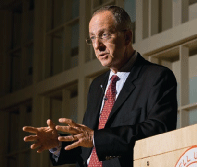Details of Cornell's financial situation have become clearer during the spring semester, and we have had to make many difficult decisions to put the University on a path to a balanced budget and a more certain financial future. Fortunately, we have exceptional leadership, including our academic deans, department chairs, and vice presidents. I remain confident of our collective ability to re-imagine the University in ways that will not only get us through the immediate crisis, but also place us on a sounder long-term course, with our excellence undiminished and our commitment to student access preserved.
 A number of factors have combined to produce budget deficits both on the Ithaca campus and at Weill Cornell Medical College (WCMC) in New York City. If unchecked, our trajectory would bring us soon to an annual deficit exceeding $228 million. Of this amount, a possible deficit of approximately $13 million could occur at WCMC, mainly related to a decline in endowment performance and a decrease in clinical revenues, if the rate of growth is less than originally anticipated. On the Ithaca campus, about $80 million of the deficit is due to the decline in endowment performance. With the approval of the Board of Trustees, we are withdrawing from the endowment another $35 million a year, for a few years, to further enhance our need-based financial aid for undergraduates and remain one of the most economically diverse campuses in our category of universities. The remaining $100 million of the projected annual deficit is the result of significantly less growth or real declines in many of the major revenue streams (state funding, federal research funding, philanthropy, and short-term investment earnings) that support important and strategic construction projects and other initiatives that the University has under way.
A number of factors have combined to produce budget deficits both on the Ithaca campus and at Weill Cornell Medical College (WCMC) in New York City. If unchecked, our trajectory would bring us soon to an annual deficit exceeding $228 million. Of this amount, a possible deficit of approximately $13 million could occur at WCMC, mainly related to a decline in endowment performance and a decrease in clinical revenues, if the rate of growth is less than originally anticipated. On the Ithaca campus, about $80 million of the deficit is due to the decline in endowment performance. With the approval of the Board of Trustees, we are withdrawing from the endowment another $35 million a year, for a few years, to further enhance our need-based financial aid for undergraduates and remain one of the most economically diverse campuses in our category of universities. The remaining $100 million of the projected annual deficit is the result of significantly less growth or real declines in many of the major revenue streams (state funding, federal research funding, philanthropy, and short-term investment earnings) that support important and strategic construction projects and other initiatives that the University has under way.
As part of an overall management philosophy that will require us to live within our means, we are reducing budgets across the Ithaca campus and in New York City. We have cancelled some faculty searches, and we have instituted an external non-faculty employee hiring pause in Ithaca in an effort to fill open positions from among our current staff, giving first priority to those whose current jobs are being eliminated.
We have also instituted a construction pause in Ithaca that in general will be in place at least through the spring semester. By the time this column appears, I anticipate that some construction and renovation projects will have gone forward, but make no mistake: Cornell will do much less construction in the years immediately ahead.
'As we go forward, we will maintain a high degree of transparency so that you will know what we're thinking and be able to share in the dialogue.'In addition, we are using reserves to pay down lines of credit that were established for a variety of operating and project needs across the University. And we are reducing the payout from our endowment to more closely match the decrease in the size and earning power of our long-term investment pool.
To protect the corpus of our endowment and ensure adequate liquidity, we have moved a significant amount of our long-term invested funds into more liquid investments and have recently sold $500 million of taxable bonds to supply additional working capital. The positive response to this bond offering reflects the confidence of the financial services community and the broader markets in Cornell's future.
Ultimately, the University will have to maintain flexibility to pursue the kinds of bold initiatives that have kept us in the top echelon of worldwide higher education. Living within our means while still renewing and extending our excellence in teaching, research, and extension to the world represents a problem of enormous dimensions.
To lead us through this period of re-examination, Provost Kent Fuchs is implementing a rigorous strategic planning process that will touch every unit and cut across the arbitrary lines that divide us. This process will be rapid and efficient but also broadly consultative, and it will help us focus on our highest priorities.
As we go forward, we will maintain a high degree of transparency so that you will know what we're thinking and be able to share in the dialogue. With leadership from Associate Vice President for Alumni Affairs Chris Marshall, Vice President for Alumni Affairs and Development Charlie Phlegar, and Vice President for University Communications Tommy Bruce, we are embarking on a variety of initiatives to increase and improve our interaction with alumni. This spring, we initiated virtual conversations in which I have been able to reach out in an interactive way to alumni beyond Ithaca. Through this mechanism and through the pages of CAM, I look forward to your guidance and support as we work together to build an even better, stronger, and more forward-looking Cornell.
— President David Skorton
david.skorton@cornell.edu


